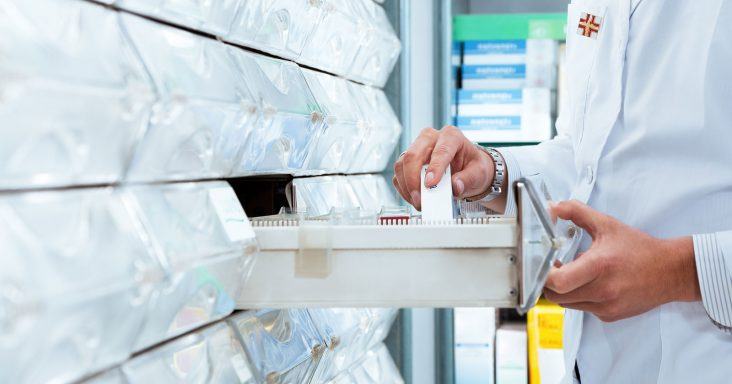Technology designed to improve pharmacy operations tested by Northwest Arkansas pharmacist
by March 7, 2017 2:42 pm 885 views

Medication errors result in one death every day and injure about 1.3 million people each year, according to the Federal Drug Administration. Biotech company PerceptiMed is trying to reduce the odds of human error in busy pharmacies.
Frank Maione, chief business officer of Mountain View, Calif.-based PerceptiMed, told Talk Business & Politics its technology ScripClip is being tested in pharmacies including the Lowell Pharmacy owned by John Lykins. He said Arkansas is one of four states in which ScripClip technology is piloted. Malone said talks are ongoing with several large retail pharmacy chains to pilot the program.
He said the pharmacist scans the NDC number of the drug into the proprietary system before placing the medication in the bag, a ScripClip bag is then scanned to pair it to the exact drug and patient information (name and birthdate). The smart bag is placed in the package bin or hung on racks awaiting customer pickup. When the customer arrives at the pharmacy to pick up the medication, the cashier enters the name and birthdate into the system and the ScripClip will flash so it’s easily seen. Not only does the bag clip flash in various colors, it also makes a slight buzzing sound. Malone said the ScripClip uses beeper technology married with RFID.
He said systems used by most retail pharmacies require clerks to file the bags of meds alphabetically by last name. This leaves the cashier having to rifle through the bags looking for the correct name, while the customer waits. He said in some pharmacies there could be multiple prescriptions for common names like Jose Garcia or Mike Johnson, which means it takes longer for clerks to double check all the identification. Pharmacies that use ScripClip don’t have to sort through a stack of bags. The flashing colored light system easily is seen. He said it saves time and reduces the chance for error. Over the past 18 months of testing 500,000 prescription bags have been processed using ScripClip with no errors.
Lykins said his pharmacy in Lowell has used ScripClip for 9 months and it has increased the efficiency of pick up for customers.
“I also like the safety it provides. It greatly decreases the chance of someone receiving the wrong medication. It takes very little time to train a new employee on the system,” Lykins told Talk Business & Politics.
Malone said the technology used in ScripClip is flexible and requires no investment for retrofitting pharmacies. He said clients pay for the technology hardware – the smart clip bags – and there is a nominal monthly maintenance fee to cover software updates. He said the typical cost per day is roughly one-hour pay of a full-time employee. He said the efficiencies gained in the customer service area easily cover that cost.
When asked about the potential for broader use of ScripClip, Malone said major chains are reviewing the system and he’s hopeful talks will continue. He said it’s the larger chains where ScripClip could have the greatest impact given the volume and potential for increased efficiency. He said there are tools in the system that allow the pharmacy tech to search the bags by fill date when it’s time to pull the no-show orders and restock the drugs. He said the ease of location of the consumer prescription at the will call register is also a time saver and could help larger pharmacy retailers with the deployment of labor at the front end while also ensuring accuracy.
He said busy pharmacies sometimes run out of popular drugs, like the widely prescribed Amoxicillin. If there is a customer waiting for a new script call-in and the pharmacy is out of the drug, the technician can query the system and search for a particular drug located in those bags awaiting customer pickup. If that drug is in any of the bags they will light up. The pharmacist could then locate the bag with the needed drug, check that medication back-into the system and use to fill the prescription for the customer waiting in the store. Malone said unclaimed prescriptions can add up to lost sales if a customer can’t get the meds they need on demand.
PerceptiMed said all of its ScripClip bags are made in the U.S. He said the company is also working on another product it calls Medpass through a National Institute of Health operating grant. He said this technology helps insure the proper dosage of medication is dispensed in long-term care facilities. Medpass is in the final stages of development and it will be tested first in Missouri.
